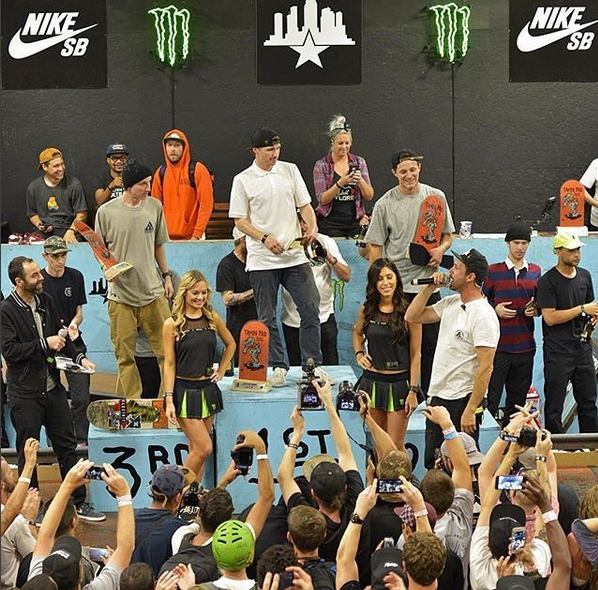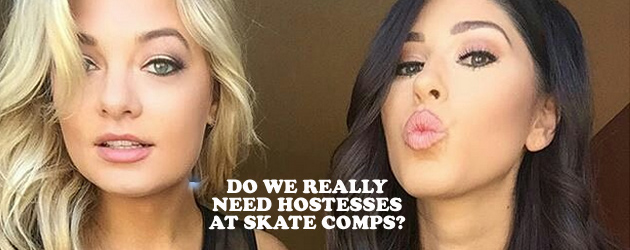
As the Instagram updates of mind-blowing skateboarding started flowing in from this weekend’s Tampa Pro event with Chris Joslin’s bs flip and Shane O’Neill’s winning run, I couldn’t help but notice the scantily-clad models standing aimlessly by the podium as the winners brandished their trophies. I’d always thought it a little repulsive at the darts, with old sweaty men walking alongside models half their age, in short dresses, but somehow hadn’t noticed it at a skate comp before. Although not shocking in itself, was it really necessary? And, as we celebrate today International Women’s Day, how does this contribute to the portrayal of women’s involvement in skateboarding?
With no women’s competition or category at Tampa Pro, the hostesses (as they are called in the industry) most likely represented the bulk of female presence during the weekend. Don’t get me wrong, I have nothing against lipstick or miniskirts, and certainly nothing against these pretty women making an easy buck. I also know, as a marketer myself, how invaluable sponsorship from big companies such as these energy drink corporations is to some events even taking place. The first question is – why do these sponsors want hostesses at skate comps in the first place?
As big brands from outside of skateboarding get involved in events such as Tampa Pro and Street League, they bring with them aspects from other sports, and try to make skateboarding more appealing to the masses. I spoke to Nic Powley, owner of Skate Pharmacy and a long-time organiser of major skateboarding events such as the UK Skate Championships here in the UK who commented that: “I guess the people that make the decisions think it’s fun to have promo girls there but then they’re probably men and they probably don’t skate either. It’s just the usual situation of people that don’t really understand skateboarding and our culture holding the purse strings, and having the power to make the big decisions – not just about having promo girls there, just generally about how skateboarding and skateboarders are portrayed and marketed to.”
One of the things which was a little disappointing about the hostesses’ presence at Tampa Pro was the concurrent lack of women’s skating over the weekend. As Nic points out, “you don’t get promo girls in Tennis or Athletics so much – there are females competing at those events on the same days so I don’t think they’d get away with it. It seems like they are mainly used at what are considered male-dominated sports such as motor racing and football, where they feel they can get away with it.” Indeed, although Street League does feature a women’s category as well as hostesses during the prize-giving, hostesses feature mainly at events notable by their absence of female competitors.
The next question is: Is there potential to move away from this sort of thing in the future, should we (a Royal skateboarding “we”) wish to?
With the amount of innovative marketing products and channels being used and developed across the world, I’m convinced there are better ways of promoting a brand in a memorable, yet more appropriate and effective way.
I caught up with Christophe Picquard, organiser of the annual world cup competition Far’n High near Paris, where the Brazilians triumphed last year with Luan Oliveira and Leticia Bufoni winning their respective categories: “We’ve never had hostesses in miniskirts at the Far’n High. I have to say when you see them at American contests you do wonder what they’re doing there, although it doesn’t really bother me. It’s not that shocking.”
Yet does he think that sponsors request the presence of hostesses unconditionally or could they be persuaded to get their message across differently? “I don’t think sponsors put a massive amount of pressure in that way, but organisers probably don’t see it as an issue.” Powley says he’s never been forced to accept to feature something at an event which he wasn’t happy with: “I imagine a brand could easily be dissuaded from it if they felt it was something that could go against their image. I think they just apply the marketing rules for Formula 1 or football to skate events and maybe that’s not the best approach.”
Although there’s a need for investment to organise bigger events, these brands clearly want to target us skateboarders and the people we appeal to – so we do have some power to steer it in the right direction. By realising that having hostesses at skate events might not appeal to most skateboarders, by then standing our ground when dealing with sponsors from outside our world, and by continuing to push women’s skateboarding more and more at events and elsewhere, as Nic and Christophe have done, we can all keep enjoying and take pride in what we do.
Undeniably, and importantly, there are currently bigger issues to address within skateboarding. As Christophe points out, “I am more concerned about girl skaters not finding sponsors because of their physical appearance, for example.”
In the meantime however, major events such as Tampa Pro and Street League are seen by a wide audience of skateboarders – some young, some girls – as well as the wider world through the media. I’m not shocked by the use of hostesses, just not convinced it’s the best way to portray skateboarding. As Nic says: ”As a young girl looking at getting into skateboarding, you’d want to see some female role models actually doing a sport or activity rather than just being a sideshow.” And that sums it up rather nicely.
Written by Claire Alleaume
